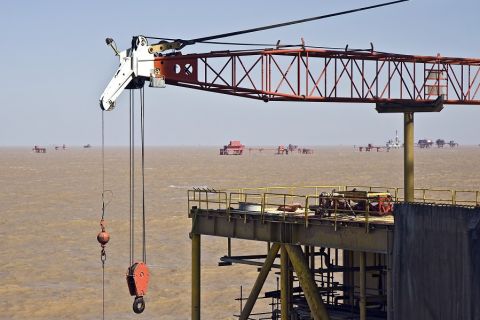In late July, the members of the Governor's Marcellus Shale Advisory Commission (MSAC) completed a unanimously adopted report that contained recommendations to develop a "comprehensive, strategic proposal for the responsible and environmentally sound development" of the Marcellus shale.
The MSAC represents the culmination of four months' work, including five public hearings, 16 public work-group meetings, more than 60 presentations, nearly 100 citizens' testimonials and more than 600 emails and letters from the public. The commission was composed of a broad range of interests, including people in the industry, environmental groups, conservation groups, geologists and environmental consultants.
The report issued 96 policy recommendations, laying the groundwork for a comprehensive plan for natural gas drilling in the state, including: comprehensive training for emergency-response personnel in the event of a spill; streamlining the permitting processes for pipeline construction; establishing an infrastructure necessary to speed the product to market; training Pennsylvanians to work in the industry; and posting more information online for the public.
The panel's recommendations, at this point, are not law. The proposals would have to be implemented through regulations or legislation and there is no particular timetable in place.
Governor Tom Corbett established the 30-member panel. Lieutenant Governor Jim Cawley, who was the chairman of the commission, said in a news release, "Pennsylvania is taking an important first step toward creating tens of thousands of jobs and leading the nation toward energy independence, and doing so in an environmentally responsible way."

New recommendations
Some of the panel's recommendations focused on efforts to reduce any possible risks to health and the environment brought about by hydraulic fracturing. Among the commission's recommendations are:
• Doubling civil penalties for violations of the Oil and Gas Act, which controls the technical and permitting aspects of oil and gas drilling in Pennsylvania.
• Expanding an operator's presumed liability for impaired water quality from 1,000 feet of an oil and gas well to 2,500 feet, and extending a liability period from six months to 12 months after the completion or alteration of a well.
• Expanding a well operator's presumed liability for impaired water quality to apply to well-stimulation practices such as hydraulic fracturing.
• Limiting the leasing of state forestland to agreements that result in zero, or minimal, surface impact.
• Creating a system within the state's Department of Health for investigating and responding to health complaints.
The commission advised the governor to impose an "impact fee" on exploration companies that drill in the state to help offset expenses being absorbed by local governments and Pennsylvania residents. Proceeds from such a fee could address the wear-and-tear on roadways, bridges and water-treatment plants in areas most affected by the "Marcellus Rush," the report stated.
Harry Weiss, a partner at Ballard Spahr LLP, which has offices in the Marcellus play, offered his perspective on which of the panel's 96 recommendations might become legislative priorities for the Pennsylvania General Assembly.
Weiss said that the legislature will probably take a hard look at amending the state's Oil and Gas Conservation Law to include the Marcellus formation. Currently, landowners can say no to oil and gas companies looking to lease Marcellus shale interests. If the law is amended, companies can appeal to the Pennsylvania Department of Environmental Protection to require landowners to release their shale rights—a practice called "forced pooling."
"One might also expect to see some attention to provisions providing for additional and more intensive oversight of drilling by the Department of Environmental Protection to address the public's concerns about hydraulic fracturing," Weiss said. "I also think emergency-response issues will get some attention in an effort to correct a perception that stems from accidents that have occurred so far could have been minimized if response would have been quicker or more efficient."
Lawmakers are likely to consider a "fee" that would address the heavier impacts of the gas boom being felt by communities on the front lines of exploration, he said. "Think of infrastructure—roads, bridges, sewer plants—that get worn down as a natural consequence of energy booms like ours."
David M. Sanko, who serves as executive director of the Pennsylvania State Association of Township Supervisors and was also a member of the Marcellus shale advisory panel, said that the report recognizes the significant role that government plays in preserving Pennsylvania's quality of life.
"We were tasked with coming up with a common-sense blueprint for Pennsylvania's future that demonstrates that we have learned from our past—coal, timber and steel expansions," he said in a public statement. "And with an eye to the future, the commission crafted a balanced, smart and safe plan for Pennsylvania that protects our precious natural resources, helps spur economic development and job creation, makes us an energy player, reduces our national dependence on foreign oil and imposes tougher civil and criminal penalties on violators."

Not enough
Meanwhile, State Senator Andy Dinniman, (D-West Chester), whose district has a high concentration of gas pipelines, favors some aspects of the commission's proposals. However, he said that the recommendations fall short in some areas.
"The commission's proposal of a drilling fee to simply cover local impacts within the drilling community falls woefully short of what's needed, what's deserved and what's obligated under the Pennsylvania Constitution," he said in a news release. "The commission's local impact-fee proposal fails to recognize the potential long-term environmental impacts of hydraulic fracturing that Pennsylvania cannot assess yet but must be ready for.
"The commission's proposal also fails to recognize the environmental and emergency-response burdens faced by those communities through which the natural gas flows to get from well to market. For example, Chester County has natural gas pipelines crossing 62 of its 73 municipalities, and we should assess a Marcellus shale tax or fee on the natural gas industry that recognizes the public-safety challenges that gas pipelines bring into our communities."
On the other hand, Dinniman said, "It was heartening to see recommendations that call for doubling penalties for violations of environmental and reporting regulations. I am also in favor of the report's proposal to increase the distance between drilling pads and wells and waterways, to strengthen safety measures and public-health monitoring and to provide Pennsylvanians training for Marcellus shale drilling jobs."
Recommended Reading
Oceaneering Won $200MM in Manufactured Products Contracts in Q4 2023
2024-02-05 - The revenues from Oceaneering International’s manufactured products contracts range in value from less than $10 million to greater than $100 million.
E&P Highlights: Feb. 5, 2024
2024-02-05 - Here’s a roundup of the latest E&P headlines, including an update on Enauta’s Atlanta Phase 1 project.
CNOOC’s Suizhong 36-1/Luda 5-2 Starts Production Offshore China
2024-02-05 - CNOOC plans 118 development wells in the shallow water project in the Bohai Sea — the largest secondary development and adjustment project offshore China.
TotalEnergies Starts Production at Akpo West Offshore Nigeria
2024-02-07 - Subsea tieback expected to add 14,000 bbl/d of condensate by mid-year, and up to 4 MMcm/d of gas by 2028.
US Drillers Add Oil, Gas Rigs for Third Time in Four Weeks
2024-02-09 - Despite this week's rig increase, Baker Hughes said the total count was still down 138 rigs, or 18%, below this time last year.




